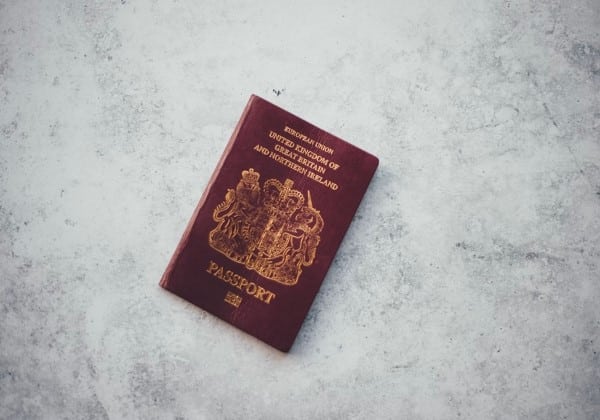Many people seek the benefits of holding two nationalities, especially those with family ties, business interests, or long-term plans in the United Kingdom. Fortunately, the UK does allow dual citizenship, meaning you can become a British citizen without giving up your original nationality, as long as your home country permits it.
We’ll explain who qualifies for UK dual citizenship, how the process works, what documents are needed, and the practical pros and cons of holding UK dual citizenship. Plus, we’ll address common questions like “Does Britain allow dual citizenship?” and “Will it affect my taxes?” so you can make an informed decision.
- What is dual citizenship?
- Does the UK allow dual citizenship?
- Benefits of UK Dual Citizenship
- Disadvantages of UK Dual Citizenship
- Which countries allow dual citizenship with the UK?
- 5 Residence Visas that Lead to UK Dual Citizenship
- Eligibility for UK Dual Citizenship
- Traveling with Two Passports as a UK Dual Citizen
- Tax Implications of UK Dual Citizenship
- Dual Nationality Between Spain and UK After Brexit
- Frequently Asked Questions
What is dual citizenship?

For example, a Canadian who naturalizes becomes a British citizen and keeps their Canadian status. Likewise, a person born abroad to a British parent may qualify for UK dual citizenship by descent, enabling them to apply for a British passport.
If you acquire British citizenship, there’s no requirement to renounce your existing nationality. This applies whether you accept British citizenship through naturalization, descent, or birth.
For example, a Canadian who becomes a British citizen via naturalization retains Canadian nationality, while someone born abroad to a British parent may qualify for UK dual citizenship by descent.
Does the UK allow dual citizenship?
Yes, the UK allows dual citizenship, and this policy is clearly stated by the Home Office and UK Visas and Immigration (UKVI).
You can become a British citizen and hold dual citizenship without needing to renounce your original nationality. The UK’s stance on dual nationality makes it possible to retain your other citizenship while gaining full rights under British citizenship law.
This flexible stance sets the UK apart from countries that restrict or prohibit dual nationality, making it attractive for those seeking a second passport for mobility, security, or family reasons.
Following Brexit, interest in UK dual citizenship has grown significantly, particularly among EU nationals looking to retain residency rights and British citizens aiming to preserve ties with the EU through secondary citizenship. This shift has also led to increased questions about dual nationality between Spain and the UK after Brexit, given the differing policies between the two nations.
Dual citizenship has become more accepted worldwide and research by the Global Intelligence Unit as part of the Global RCBI Report showcases it has become a strategic tool to secure access, mitigate risk, and improve life chances. Despite the fact that Brexit highlighted global boundaries, there is still very much a demand for a more free life across borders.
Benefits of Dual Citizenship in the UK

- Travel freedom and two passports: As someone holding British dual citizenship, you are entitled to travel with two passports, typically your British passport and that of your other country. This flexibility is one of the practical benefits of British citizenship. This allows you to take advantage of visa-free access to more countries, smoother immigration procedures, and fewer travel restrictions.
- Residence and work rights: You’ll have unrestricted right of abode in the UK, meaning you can live, work, study, and retire without visa limitations. If your second country also grants full citizenship rights, you’ll enjoy the same benefits there as well, giving you flexibility and long-term options.
- Access to services: As a British citizen, you qualify for public services including NHS Healthcare, state pensions, public education for children, and Home Office protections abroad. Having access to two national systems can be especially useful in times of crisis.
- Inheritance and descent rights: Dual citizens often have expanded inheritance and family reunification rights, and in many cases, you can pass UK citizenship to your children, especially if you did not receive citizenship by descent.
- Cultural and economic ties: Dual nationality allows you to retain ties to your country of origin while integrating fully into British society. This is particularly important for those who have family, cultural roots, or business interests in more than one nation.
- Global mobility and investment: For global investors and entrepreneurs dual citizenship can open up access to favorable tax regimes, investment rights and property ownership, business registration and offshore banking. This is why many people explore citizenship through investment or UK dual citizenship by naturalization as part of long-term financial planning.
Disadvantages of Dual Citizenship in the UK
While the advantages are significant, there are some important drawbacks to holding UK dual nationality, especially if your other country imposes stricter obligations or conflicts of law.
- Tax obligations in two countries: Depending on your country of residence and citizenship, you could be subject to double taxation. For example, the UK dual citizenship tax implications differ from those in countries like the United States, which taxes based on citizenship regardless of residency. The UK has double taxation agreements (DTAs) to help avoid being taxed twice on the same income.
- Conflicting legal duties: You may be subject to conflicting laws in your two countries, such as military service obligations, mandatory voting and foreign asset reporting. Some countries aside from the UK require citizens to notify authorities if they hold another nationality or penalize those with dual citizenship under domestic laws.
- Consular limitations: When in one of your home countries, the embassy of the other may not be able to provide full consular assistance.
- Immigration/travel issues: Some countries require dual nationals to enter and exit using their local passport. Traveling with two passports can become complicated if you lose one or fail to meet entry requirements for your second country.
- Restrictions on public office: Although rare in the UK, certain sensitive government roles may require you to hold British citizenship only. Other countries may prohibit dual citizens from holding public office, voting, or receiving classified information.
Which countries allow dual citizenship with the UK?
5 Residence Visas that Lead to UK Dual Citizenship
Foreign nationals or those with EU citizenship must acquire residence visas to begin the naturalization route to British citizenship.
Below are 5 key visa routes that can lead to UK citizenship through naturalization, along with their updated eligibility requirements:
1. Spouse or Partner Visa (Family Visa)
- Purpose: Allows non-British partners of British citizens or settled persons to live in the UK.
- Duration: Initially 2 years and 9 months on entry clearance, renewable for another 2 years and 6 months. After 5 years total on a partner route, you can apply for Indefinite Leave to Remain (ILR).
- Requirements:
- Legally married, in a civil partnership, or living together in a relationship for ≥2 years.
- Proof of a genuine relationship (photos, correspondence, shared bills).
- Financial income of at least £29,000 per year (or savings equivalent), rising with dependent children.
- Adequate UK accommodation.
- English language ability (A1 level for entry; B1 level for ILR).
- Payment of the Immigration Health Surcharge (IHS).
- Path to citizenship: After obtaining ILR and living in the UK for 12 months (unless married to a Brit, in which case you can apply immediately), you can apply for British citizenship.
2. Ancestry Visa
- Purpose: Enables Commonwealth citizens to live and work in the UK if they have grandparents that were born in the UK.
- Duration: Granted for 5 years and is renewable.
- Requirements:
- Be a citizen of a Commonwealth country (e.g., Australia, Canada, South Africa).
- Have at least one grandparent born in the UK, Channel Islands, Isle of Man, or pre‑1922 Ireland.
- Intend to work in the UK (no job offer needed at application).
- Support yourself without recourse to public funds.
- Path to citizenship: After 5 years you can apply for ILR (with 180 days outside the UK per year). Then, after 12 months with ILR, you may naturalize.
3. UK Student Visa (Tier 4: General Student Visa)
- Purpose: For full-time study at a UK-licensed educational institution.
- Duration: Valid for the duration of your study (e.g., 3–4 years for a degree).
- Requirements:
- Unconditional offer from a licensed provider (Confirmation of Acceptance for Studies).
- Funds to cover tuition and living expenses.
- English ability sufficient for the course (e.g., valid IELTS).
- IHS paid for healthcare coverage.
- Path to citizenship: The Student Visa alone doesn’t directly lead to British citizenship, but it can serve as an important first step in your UK dual citizenship journey. Graduates may switch to a Graduate or Skilled Worker Visa (see below), then after qualifying periods, ILR to citizenship.
4. Graduate Visa (Post-Study Work Visa)
- Purpose: Allows international students to work or look for work after completing a degree.
- Duration:
- 2 years for Bachelor’s or Master’s graduates.
- 3 years for Ph.D. graduates.
- Requirements:
- Must apply while holding a valid Student Visa.
- No sponsorship or job offer needed.
- Path to citizenship: Does not directly lead to ILR or citizenship but allows time to switch to the Skilled Worker Visa.
5. Skilled Worker Visa
- Purpose: For skilled employment in the UK under employer sponsorship.
- Duration: Up to 5 years, with the possibility to renew.
- Requirements:
- Job offer from a UK employer with a Certificate of Sponsorship.
- Role must be RQF Level 3 or above (A-level or equivalent).
- Minimum salary of £26,200 or the job’s “going rate”.
- English proficiency at B1 level or higher.
- Path to citizenship: After 5 years on this visa, eligible to apply for ILR; after 12 more months holding ILR, you may apply for British citizenship.
Eligibility for UK Dual Citizenship
To become a dual citizen in the UK, you must first qualify for British citizenship through one of the following legal pathways. Once you’re a British citizen, you can apply for a British passport and enjoy the benefits of UK dual citizenship.
- Naturalization: For adults who have lived in the UK for several years.
- Citizenship by descent: If you were born outside the UK to a British parent.
- Registration: For certain children or individuals with historic ties to the UK.
- Birth or adoption in the UK, depending on parents’ status.
The most common route for adults is naturalization, which requires:
- Indefinite Leave to Remain (ILR) or EU Settled Status.
- At least 5 years of lawful residence (or 3 years if married to a British citizen).
- Passing the Life in the UK Test.
- Meeting English language requirements.
- A clean “good character” record.
- Demonstrated intent to live in or maintain strong links to the UK.
Traveling with Two Passports as a UK Dual Citizen

- Use your British passport when entering or leaving the UK
- Use your other passport when entering your other country of nationality
This can save you time at border controls, help you avoid visa requirements, and streamline entry when traveling abroad.
However, you must always carry both passports when traveling between your two countries of nationality, especially if one has travel restrictions on foreign nationals.
Tax Implications of UK Dual Citizenship
One of the most common concerns is, “Will having UK dual citizenship affect my taxes?” The short answer is: potentially, yes. This depends on your country of residence, income sources, and tax treaties in place.
The UK taxes residents on their worldwide income and non-residents on UK-sourced income. If your other country also taxes based on residency or citizenship (for example, the US), you may be subject to dual citizenship tax obligations.
To reduce tax liability, dual citizens may benefit from:
- Double taxation agreements (DTAs).
- Foreign Tax Credit mechanisms.
- Non-domicile status or the remittance basis of taxation, if applicable.
Dual Nationality Between Spain and UK After Brexit
The question of dual nationality between Spain and the UK after Brexit is particularly relevant for individuals seeking UK dual citizenship while maintaining ties to Spain.
Here’s the key point: Spain does not currently permit dual citizenship with the UK, except in rare and specific circumstances. This poses a challenge for those who wish to retain British citizenship while becoming Spanish nationals.
Under Spanish nationality law, dual nationality is only recognized with a select group of countries, including:
- Latin American nations
- Andorra
- The Philippines
- Equatorial Guinea
- Portugal
- France (as of 2022)
Because the UK is not on this list, British nationals who apply for Spanish citizenship must usually renounce their UK nationality.
This became a growing concern for long-term British residents in Spain post-Brexit, especially those who previously enjoyed freedom of movement under EU law.
That being said, UK citizens can hold permanent residence in Spain without becoming Spanish nationals. Alternatively, some explore residency routes without full naturalisation, such as the Spain Non-Lucrative Visa.
How Can Global Citizen Solutions Help You?
Global Citizen Solutions is a boutique migration consultancy firm with years of experience delivering bespoke residence and citizenship by investment solutions for international families. With offices worldwide and an experienced, hands-on team, we have helped hundreds of clients worldwide acquire citizenship, residence visas, or homes while diversifying their portfolios with robust investments.
We guide you from start to finish, taking you beyond your citizenship or residency by investment application.

Frequently Asked Questions about UK Dual Citizenship
Is dual citizenship allowed in the UK?
Yes. Britain permits dual or even triple citizenship, so you may become a British citizen without giving up your existing nationality, provided your home country also allows it.
What is dual citizenship in the UK?
Dual citizenship (also called dual nationality) means you are simultaneously recognised as a British citizen and a citizen of another country, with the right to hold both passports, vote, live and work in the UK, and receive consular help abroad.
How do I know if I qualify for UK dual citizenship?
You must first qualify for British citizenship by descent, naturalization, birth, registration, or adoption. Naturalization, the most common adult route, normally requires:
- Indefinite Leave to Remain (ILR) or EU settled status
- Five years’ lawful residence (or three if married to a Briton)
- Passing the Life in the UK Test and an approved English test
- “Good character” and intent to keep the UK as your main home
Once naturalised, you automatically hold dual citizenship if you keep your original nationality.
Can I be a dual citizen of the US and UK?
Yes. Both countries recognise multiple nationality, so you may legally hold a US and UK passport.
Can I have dual nationality Spain–UK after Brexit?
Generally no. Spain only allows dual nationality with select Latin-American countries including Portugal, Andorra, the Philippines, and a few others but not the UK.
A Brit naturalizing in Spain would usually need to renounce UK citizenship, although limited exceptions exist.
Which countries allow dual citizenship with the UK?
Many do, including Australia, Canada, France, Germany, Greece, Ireland, Italy, Pakistan, the Philippines, Portugal, Sweden and the United States. Always confirm with the other country’s consulate before applying.
Will UK dual citizenship affect my taxes?
Possibly. The UK taxes you mainly on UK-source income and on worldwide income if you are your country of tax residency is the UK. Dual citizens may owe tax in both countries but can usually claim relief under a double taxation agreement or the UK’s foreign-income remittance and domicile vs residence rules.
How long does it take to get dual citizenship in the UK?
After you submit a complete application and biometrics, the Home Office (UKVI) aims to decide most naturalization cases within six months, though complex cases can take longer.
Can my child get UK citizenship if born overseas?
A child born abroad is considered a British citizen by descent if at least one parent had British citizenship at the time of their birth. The child of an EU citizen who had settled status in the UK via Indefinite Leave to Remain at the time of birth may also have the right to British citizenship, depending on when they were born.
Do I need to renounce my other citizenship to become British?
No. The UK never requires renunciation. However, you may still choose (or be forced by the other country) to give up UK nationality after naturalizing elsewhere.
Can dual citizens hold a British passport and another passport?
Absolutely. Traveling with two passports is common. Use your British passport to enter and exit the UK and your other passport to enter its issuing country, which often speeds up immigration and avoids visa-related fees.
What is the difference between British citizenship and dual citizenship?
British citizenship gives you the full rights of a UK national, including the right to live, work, and vote in the UK.
UK dual citizenship means you’re recognized as a British citizen while retaining another nationality, enabling you to enjoy the legal rights and responsibilities of both.
Do I need to have a British passport to apply for dual citizenship in the UK?
No, you don’t need to already have a British passport. You first need to obtain British citizenship, typically through naturalisation.
Once granted, you can apply for a British passport as proof of your nationality and as part of your dual citizenship documentation.
What is EU Settled Status?
EU Settled Status is an immigration status granted to EU, EEA, and Swiss citizens (and their eligible family members) who were living in the UK before 31 December 2020, under the terms of the EU-UK Withdrawal Agreement (in other words, post-Brexit).
What is Indefinite Leave to Remain?
Indefinite Leave to Remain (ILR) is a form of permanent residency in the United Kingdom. It allows a person to live, work, and study in the UK without any time restrictions and is a key step on the path to British citizenship through naturalization.


